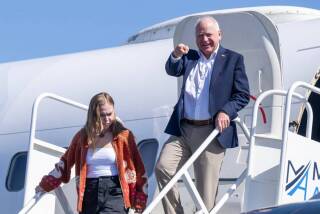Court to Decide if Parties Can Endorse Candidates
- Share via
WASHINGTON — The Supreme Court agreed Monday to decide whether California can prohibit its political parties from endorsing candidates in primary elections.
The case, which will be heard in the fall, tests a 1913 Progressive era statute that was intended to give the voters, not party officials, control over who got on the general election ballot.
In 1984, party officials in San Francisco and Los Angeles challenged the law, contending that it violated their rights to speak out on political issues. Judge Marilyn Hall Patel agreed with the challenge and, since then, state attorneys have continued to file appeals.
Last year, in its second hearing on the issue, the U.S. 9th Circuit Court of Appeals also struck down the law. As a result, the California Democratic Party, meeting in Palm Springs last March, announced endorsements in more than 100 races, including one for Lt. Gov. Leo T. McCarthy in his bid to unseat U.S. Sen. Pete Wilson, a Republican. McCarthy has no major primary opposition.
The state Republican Party has not followed suit. Its leaders chose not to endorse candidates before the June primary.
The legal issue in the case of March Fong Eu vs. San Francisco County Democratic Central Committee, 87-1269, may seem a dry one: the extent of the state’s power to regulate the parties. But for political scientists and politicians, the case is a fascinating one.
A group of prominent political scientists, including James MacGregor Burns of Williams College, filed court statements in support of the party officials. They contend that today’s political parties are not too strong, but too weak.
The image of the smoke-filled room where party elders chose a candidate behind closed doors has given way to today’s reality that candidates can vault to a party nomination simply by spending lavishly on mass mailings or a media campaign.
The demise of political parties as an important force in California was caused in part by the state law that saps their power, the professors said.
In a court brief, Peter D. Kelly, chairman of the California Democratic Party, said the lower-court ruling permitting party endorsements has “revitalized” the party and created a new level of enthusiasm about the party’s affairs.
But enhancing the power of party officials could also sap the clout of legislative leaders in Sacramento. For that reason, according to some lawyers in the case, key Democratic and Republican leaders in the Legislature have favored the state’s appeal.
California attorneys say the state law helps to prevent “an ideological faction” from taking control of the statewide party. The state has a “strong and legitimate interest in establishing democratic management of the internal affairs of the ballot-qualified political parties,” said the state’s appeal to the high court.
Recent Ruling
Although the justices agreed to hear the appeal, their most recent ruling on the issue tends to favor the parties. In 1986, the court struck down a Connecticut law that prohibited the state’s Republican Party from letting independents vote in its primary elections. On a 5-4 vote, the high court concluded that the party has the authority to run its own affairs.
In its opinion striking down the California law, the 9th Circuit Court noted that California is the only state to continue to prohibit pre-primary endorsements. Other states have either repealed their restrictions or had them struck down by the courts.
More to Read
Get the L.A. Times Politics newsletter
Deeply reported insights into legislation, politics and policy from Sacramento, Washington and beyond. In your inbox twice per week.
You may occasionally receive promotional content from the Los Angeles Times.










